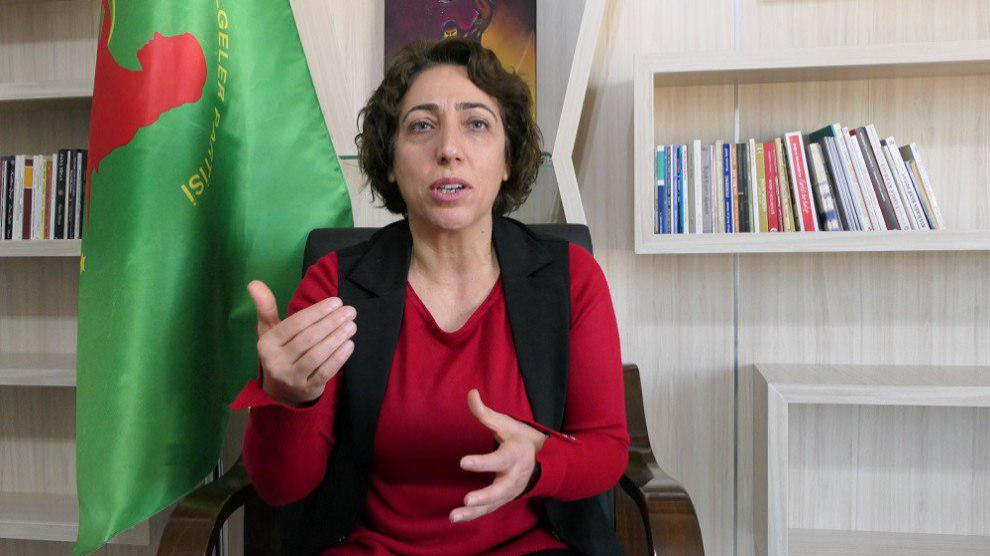DBP's Aydeniz: The AKP wants more war
Destruction, denial, assimilation and silencing unfortunately continue to be the main basis of the AKP policy, said the co-chair of the DBP.
Destruction, denial, assimilation and silencing unfortunately continue to be the main basis of the AKP policy, said the co-chair of the DBP.

Saliha Aydeniz, co-chair of the Democratic Regions Party (DBP), evaluated the war policies of the AKP government in Kurdistan.
Saliha Aydeniz said that the Turkish state has carried out a policy based on denial, destruction and assimilation since its foundation and added that the AKP has simply continued these policies.
Reminding the Armenian and Syriac genocides, Aydeniz stated that the mentality of massacre did not change. "When the AKP came to power, it came with the promises of freedom and democracy. But if we evaluate the 18 years that passed since it came into power, we see that only the ways and methods have changed. Destruction, denial, assimilation and silencing unfortunately continue to be the main basis of the AKP policy."
Aydeniz said: "As a result of the AKP's war policies, the isolation of Kurdish people's leader Abdullah Öcalan has been aggravated since 2015. As it is known, there was the process of Oslo negotiations in 2009, Mr. Öcalan took a great responsibility to solve the Kurdish problem in a democratic way. However, the Oslo operations were carried out during the Oslo process. Then they said he was one of the "Fetö" followers Fetullah Gulen]. Those who were arrested remained in prisons for 5-6 years and were later sentenced."
The AKP, insisted Aydeniz, "said that we will judge everyone who committed the massacre through the so called Ergenekon operations, but later they were all acquitted. JITEM files were closed one by one, although their perpetrators were certain. JITEM members were acquitted one by one. When we consider all these, we see that this government has not given up on its hundred years of denial and destruction policies. Ways and methods may have changed, but the state massacre policies have not changed in any way."
Aydeniz then reminded that between 2013 and 2015 talks Öcalan were carried out. We witnessed the best period of the economy. Everyone was sure we were going towards Turkey democratization. Negotiations began on 3 January and on 9 January 3 Kurdish women in Paris were executed by MIT hands."
Unfortunately, said Aydeniz, "Turkey is experiencing a coup every 10 years or so. Dark forces of racism prevent the peoples of Turkey to move towards democratization. On 7 June 2015, voters clearly demonstrated that the country could not be ruled with a single-man mentality. There was a situation where the AKP could not be in power alone, but on 5 April 2015, they began the heavy isolation against Mr. Öcalan. They had already decided to continue their war policy. Incidents took place in Ceylanpınar first, then on 5 June in Amed, on 20 July Suruç, on 10 October in Ankara where massacres took place. A bomb was detonated at the Kurdish wedding in Antep. On 1 November the AKP came to power again, but until that time, many massacres took place, thousands of people died. A government that ruled in this way does not want to develop democracy, justice and unity, but on the contrary only promotes war and massacre."
Expressing that the people who were exposed to massacres were the most opposed to the coup attempt in 2016, Aydeniz said: "The State of Emergency (OHAL) was declared. Then, people were victimized more, new massacres were carried out, curfews were declared, 96 municipalities were appointed trustees. Tens of television and press institutions were closed again."
Aydeniz reminded that "Women were again primarily targeted during the AKP period."
Saying that international powers have a share in the war, Aydeniz said: "The international conspiracy against Öcalan was put into operation on 9 October 1998. The attacks against Rojava started on 9 October 2019. A pattern emerge there. Afrin was attacked on 20 January 2018 with the approval of the international forces. The international conspiracy continued in this way."
Aydeniz continued: "This war is being carried out by the government of Turkey but is affecting the entire international community. Yet international states say nothing or cooperate with Turkey. Why? Because they want to redesign the Middle East."